牛津译林版(2019)选择性必修 第一册Unit 1 Food matters Grammar and usage课件(共17张PPT)
文档属性
| 名称 | 牛津译林版(2019)选择性必修 第一册Unit 1 Food matters Grammar and usage课件(共17张PPT) |

|
|
| 格式 | pptx | ||
| 文件大小 | 28.5MB | ||
| 资源类型 | 教案 | ||
| 版本资源 | 牛津译林版(2019) | ||
| 科目 | 英语 | ||
| 更新时间 | 2023-07-30 00:00:00 | ||
图片预览

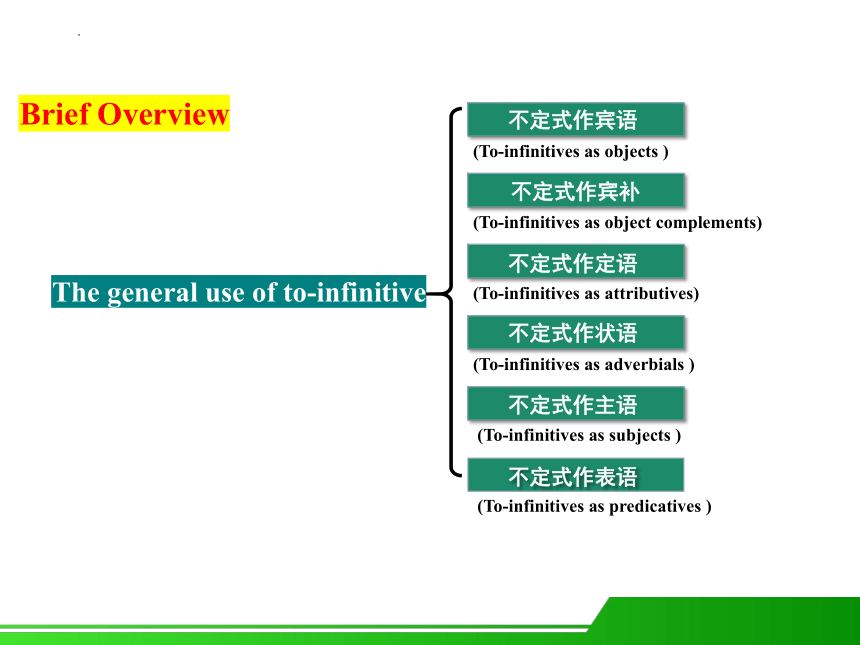

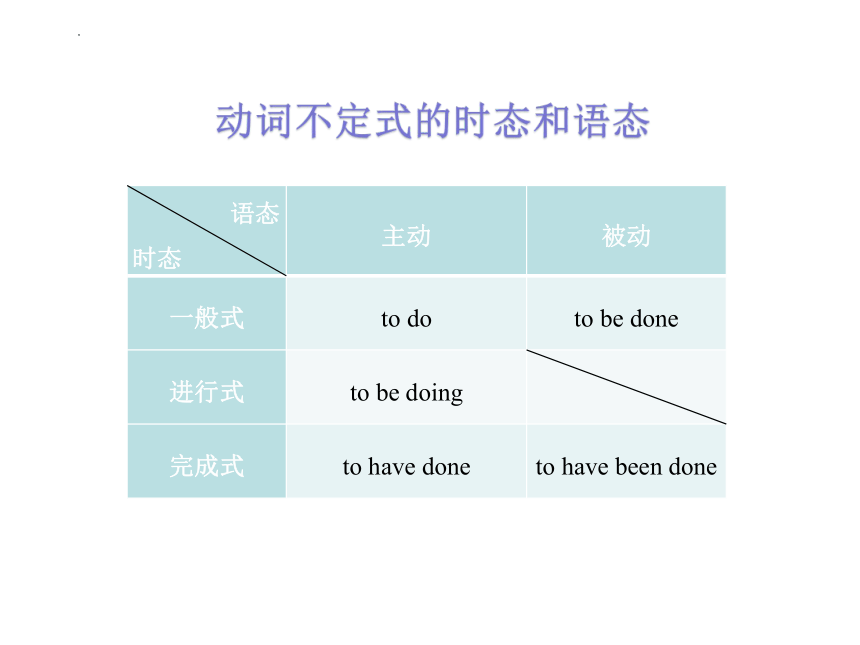
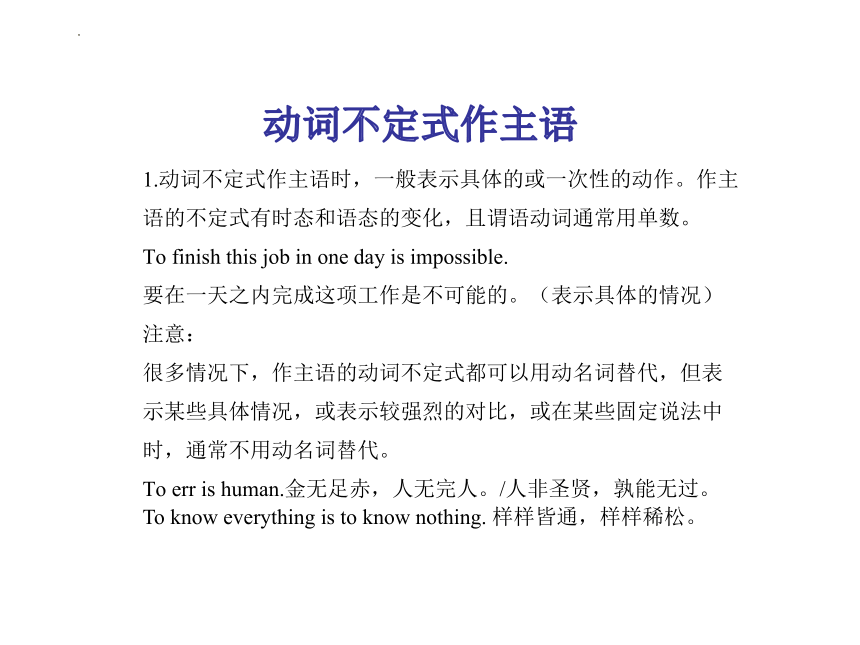
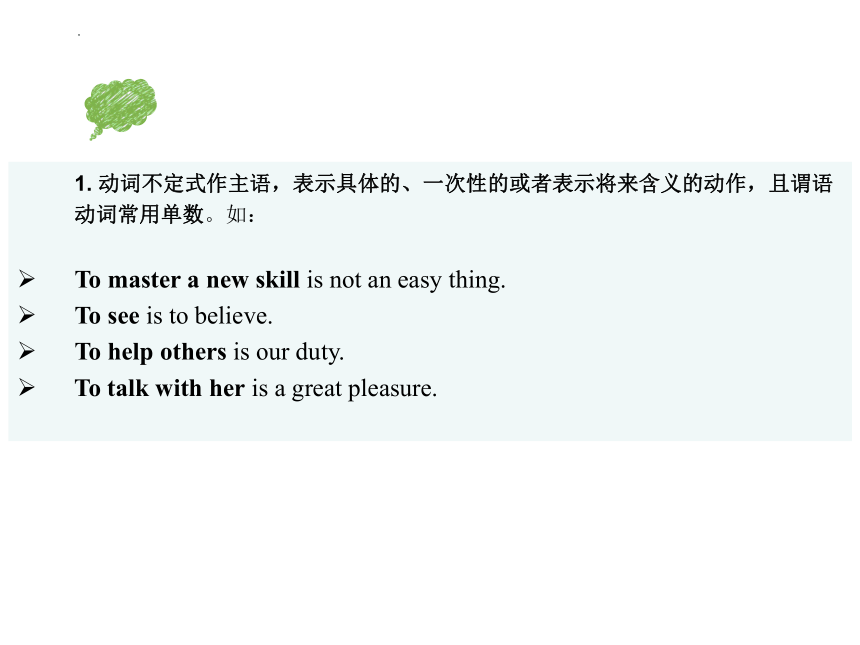
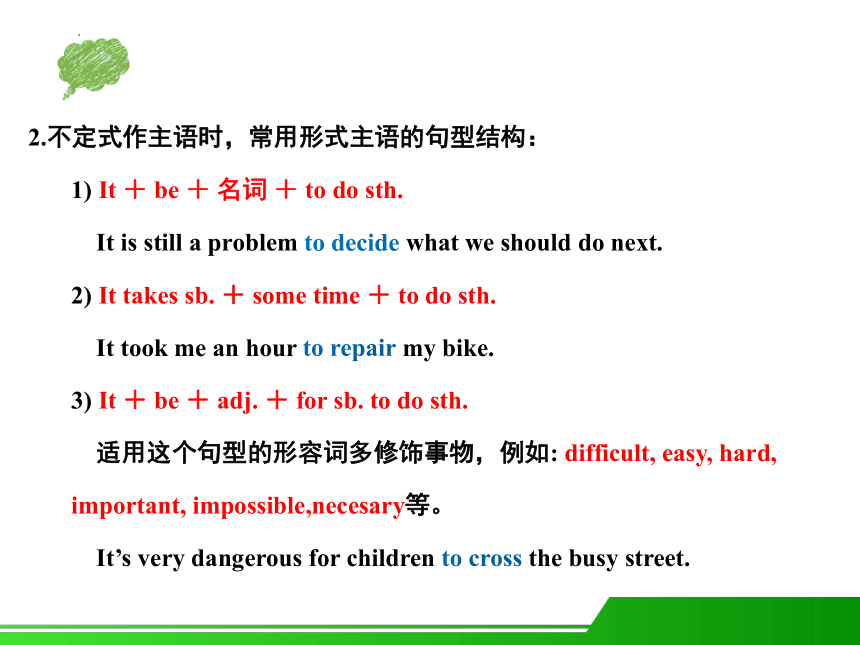
文档简介
(共17张PPT)
unit1 Grammar and usage
不定式作定语
不定式作状语
不定式作主语
(To-infinitives as subjects )
(To-infinitives as adverbials )
(To-infinitives as attributives)
不定式作宾补
(To-infinitives as object complements)
不定式作表语
(To-infinitives as predicatives )
The general use of to-infinitive
不定式作宾语
(To-infinitives as objects )
Brief Overview
动词不定式作主语和表语
动词不定式的时态和语态
语态时态 主动 被动
一般式 to do to be done
进行式 to be doing
完成式 to have done to have been done
动词不定式作主语
1.动词不定式作主语时,一般表示具体的或一次性的动作。作主语的不定式有时态和语态的变化,且谓语动词通常用单数。
To finish this job in one day is impossible.
要在一天之内完成这项工作是不可能的。(表示具体的情况)
注意:
很多情况下,作主语的动词不定式都可以用动名词替代,但表示某些具体情况,或表示较强烈的对比,或在某些固定说法中时,通常不用动名词替代。
To err is human.金无足赤,人无完人。/人非圣贤,孰能无过。
To know everything is to know nothing. 样样皆通,样样稀松。
1. 动词不定式作主语,表示具体的、一次性的或者表示将来含义的动作,且谓语
动词常用单数。如:
To master a new skill is not an easy thing.
To see is to believe.
To help others is our duty.
To talk with her is a great pleasure.
2.不定式作主语时,常用形式主语的句型结构:
1) It + be + 名词 + to do sth.
It is still a problem to decide what we should do next.
2) It takes sb. + some time + to do sth.
It took me an hour to repair my bike.
3) It + be + adj. + for sb. to do sth.
适用这个句型的形容词多修饰事物,例如: difficult, easy, hard, important, impossible,necesary等。
It’s very dangerous for children to cross the busy street.
不定式作主语时,常用形式主语的句型结构:
4)It’s + adj. + of sb. + to do sth
适用这个句型的形容词多为修饰人,例如: careless, clever, foolish, honest, kind, lazy, nice, right, silly, stupid, wise等。
It’s clever of you to work out the maths problems.
= You are clever to work out the maths problems.
adverbial
3. “特殊疑问词 + 不定式” 构成的不定式短语作主语时,且谓语动词常用单数。常见的特殊疑问词有:what , who , which , when , where , why , how 等。如:
Where to hold the meeting hasn’t been decided.
How to relieve the pain is a question.
动词不定式作表语
不定式作表语,放在系动词 be, seem, remain, prove, turn out 等之后,通常用来说明主语的具体内容或性质。常见用作主语的名词有: aim, duty, dream, hope, idea, plan, ambition, purpose, task, job等表示目标、意向、计划、任务的词。如:
My goal is to enter my dream university.
2. Whether we will succeed or not remains to be seen.
Attention :
1.当主语部分有实义动词do或do的某种形式时,作表语的不定式可以省略to。
All I could do now is (to) keep silent.
2. 不定式和动名词都可以作表语,但不定式作表语强调的是一次性的、具体的、将要发生的动作;动名词作表语强调的是一般性的,抽象的、经常发生的动作。如:
The man’s job is to paint the walls. (表示一次性的事)
The man’s job is painting the walls. (表示经常性的日常工作)
3. 某些动词不定式与be动词连用时常用主动形式表被动意义。如:
The house is to rent.
Who is to blame for the accident
4. 有些系动词,如sound(听起来)、smell(闻起来)、taste(尝起来)、feel(感觉)、become(成为)等,通常不可以接不定式作表语。
练习:判断下列句子正误
It smells to be delicious.
The book seems available.
The cake tastes to be yummy.
F
T
F
语法全解训练
Ⅰ. 用括号内所给动词的正确形式完成下列句子
1. Most natives here prefer frying steaks in a pan to (boil)or steaming them in a pot.
[词汇复现]
2. (tell)you the truth,there is an association between food and mood. [词汇复现]
3. (lower)her calories,the doctor advised her to stop eating sweets greedily.
[词汇复现]
4. It is no good (eat)food that is too sweet,too sour or too salty. [词汇复现]
5. The chef has thrown himself into Chinese cuisine (enhance)his cooking
skills. [词汇复现]
6. The smell of the dessert can do the trick,not (mention)the lovely creamy
flavour. [词汇复现]
7. It is very important (ensure)food security for people’s health. [词汇复现]
boiling
To tell
To lower
eating
to enhance
to mention
to ensure
Ⅱ . 根据括号内提示,选择正确的动词形式填空
1. We must do what we can those who are in trouble.(help;to help)
2. I think these problems are easy ,so you don’t have to ask the teacher for help.(to work out;to be worked out)
3. Every minute should be made full use of our lessons well.(to study;studying)
4. Emily stopped her car a black cat across the street.(let/to run;to let/run)
5. Paul doesn’t have to be made . He always works hard.(learn;to learn)
6. The telephone is generally considered to by Alexander Bell.(be invented;have been invented)
7. It is careless the same mistake again in your composition.(for you to make;of you to make)
to help
to work out
to study
to let
to learn
have been invented
of you to make
run
of you to make
have been invented
to help
to work out
to study
to let
to learn
run
8. — Why not someone your letter (to get/type;get/to type)
—No one can find a typewriter around here.
9. Anxiously,she took the dress out of the package and tried it on,only
it didn’t fit.(to find;finding)
10. —I hope to take the computer course.
— Good idea. more about it,visit this website.(Find out;To find out)
11. He is thought foolishly. Now he has no one but himself to blame for losing the job.(to act;to have acted)
12. There are still many problems before we are ready for a long stay on the Moon. (solved;to be solved)
get
to type
to find
To find out
to have acted
to be solved
to find
To find out
to have acted
to be solved
get
to type
Ⅲ . 用所给词语的正确形式完成句子
1. My mother often tells me in bed.(not read)
2. In the old days it was difficult for the poor a job.(find)
3. It’s cold outside,so you’d better your coat. (put on)
4. He is hungry. Please give him something . (eat)
5. I would rather by bus,or I will be late.(go)
6. He called at every door people the exciting news.(tell)
7. Would you please me an English-Chinese dictionary when you come (bring)
8. John stopped a rest because he had worked for eight hours.(have)
9. It’s a great shame for me in front of so many people.(laugh at)
10. Little Jenny liked to to the zoo on Sundays. (take)
not to read
to find
put on
to eat
go
to tell
bring
to have
to be laughed at
be taken
be taken
to be laughed at
bring
to have
not to read
to find
put on
to eat
go
to tell
THANKS
unit1 Grammar and usage
不定式作定语
不定式作状语
不定式作主语
(To-infinitives as subjects )
(To-infinitives as adverbials )
(To-infinitives as attributives)
不定式作宾补
(To-infinitives as object complements)
不定式作表语
(To-infinitives as predicatives )
The general use of to-infinitive
不定式作宾语
(To-infinitives as objects )
Brief Overview
动词不定式作主语和表语
动词不定式的时态和语态
语态时态 主动 被动
一般式 to do to be done
进行式 to be doing
完成式 to have done to have been done
动词不定式作主语
1.动词不定式作主语时,一般表示具体的或一次性的动作。作主语的不定式有时态和语态的变化,且谓语动词通常用单数。
To finish this job in one day is impossible.
要在一天之内完成这项工作是不可能的。(表示具体的情况)
注意:
很多情况下,作主语的动词不定式都可以用动名词替代,但表示某些具体情况,或表示较强烈的对比,或在某些固定说法中时,通常不用动名词替代。
To err is human.金无足赤,人无完人。/人非圣贤,孰能无过。
To know everything is to know nothing. 样样皆通,样样稀松。
1. 动词不定式作主语,表示具体的、一次性的或者表示将来含义的动作,且谓语
动词常用单数。如:
To master a new skill is not an easy thing.
To see is to believe.
To help others is our duty.
To talk with her is a great pleasure.
2.不定式作主语时,常用形式主语的句型结构:
1) It + be + 名词 + to do sth.
It is still a problem to decide what we should do next.
2) It takes sb. + some time + to do sth.
It took me an hour to repair my bike.
3) It + be + adj. + for sb. to do sth.
适用这个句型的形容词多修饰事物,例如: difficult, easy, hard, important, impossible,necesary等。
It’s very dangerous for children to cross the busy street.
不定式作主语时,常用形式主语的句型结构:
4)It’s + adj. + of sb. + to do sth
适用这个句型的形容词多为修饰人,例如: careless, clever, foolish, honest, kind, lazy, nice, right, silly, stupid, wise等。
It’s clever of you to work out the maths problems.
= You are clever to work out the maths problems.
adverbial
3. “特殊疑问词 + 不定式” 构成的不定式短语作主语时,且谓语动词常用单数。常见的特殊疑问词有:what , who , which , when , where , why , how 等。如:
Where to hold the meeting hasn’t been decided.
How to relieve the pain is a question.
动词不定式作表语
不定式作表语,放在系动词 be, seem, remain, prove, turn out 等之后,通常用来说明主语的具体内容或性质。常见用作主语的名词有: aim, duty, dream, hope, idea, plan, ambition, purpose, task, job等表示目标、意向、计划、任务的词。如:
My goal is to enter my dream university.
2. Whether we will succeed or not remains to be seen.
Attention :
1.当主语部分有实义动词do或do的某种形式时,作表语的不定式可以省略to。
All I could do now is (to) keep silent.
2. 不定式和动名词都可以作表语,但不定式作表语强调的是一次性的、具体的、将要发生的动作;动名词作表语强调的是一般性的,抽象的、经常发生的动作。如:
The man’s job is to paint the walls. (表示一次性的事)
The man’s job is painting the walls. (表示经常性的日常工作)
3. 某些动词不定式与be动词连用时常用主动形式表被动意义。如:
The house is to rent.
Who is to blame for the accident
4. 有些系动词,如sound(听起来)、smell(闻起来)、taste(尝起来)、feel(感觉)、become(成为)等,通常不可以接不定式作表语。
练习:判断下列句子正误
It smells to be delicious.
The book seems available.
The cake tastes to be yummy.
F
T
F
语法全解训练
Ⅰ. 用括号内所给动词的正确形式完成下列句子
1. Most natives here prefer frying steaks in a pan to (boil)or steaming them in a pot.
[词汇复现]
2. (tell)you the truth,there is an association between food and mood. [词汇复现]
3. (lower)her calories,the doctor advised her to stop eating sweets greedily.
[词汇复现]
4. It is no good (eat)food that is too sweet,too sour or too salty. [词汇复现]
5. The chef has thrown himself into Chinese cuisine (enhance)his cooking
skills. [词汇复现]
6. The smell of the dessert can do the trick,not (mention)the lovely creamy
flavour. [词汇复现]
7. It is very important (ensure)food security for people’s health. [词汇复现]
boiling
To tell
To lower
eating
to enhance
to mention
to ensure
Ⅱ . 根据括号内提示,选择正确的动词形式填空
1. We must do what we can those who are in trouble.(help;to help)
2. I think these problems are easy ,so you don’t have to ask the teacher for help.(to work out;to be worked out)
3. Every minute should be made full use of our lessons well.(to study;studying)
4. Emily stopped her car a black cat across the street.(let/to run;to let/run)
5. Paul doesn’t have to be made . He always works hard.(learn;to learn)
6. The telephone is generally considered to by Alexander Bell.(be invented;have been invented)
7. It is careless the same mistake again in your composition.(for you to make;of you to make)
to help
to work out
to study
to let
to learn
have been invented
of you to make
run
of you to make
have been invented
to help
to work out
to study
to let
to learn
run
8. — Why not someone your letter (to get/type;get/to type)
—No one can find a typewriter around here.
9. Anxiously,she took the dress out of the package and tried it on,only
it didn’t fit.(to find;finding)
10. —I hope to take the computer course.
— Good idea. more about it,visit this website.(Find out;To find out)
11. He is thought foolishly. Now he has no one but himself to blame for losing the job.(to act;to have acted)
12. There are still many problems before we are ready for a long stay on the Moon. (solved;to be solved)
get
to type
to find
To find out
to have acted
to be solved
to find
To find out
to have acted
to be solved
get
to type
Ⅲ . 用所给词语的正确形式完成句子
1. My mother often tells me in bed.(not read)
2. In the old days it was difficult for the poor a job.(find)
3. It’s cold outside,so you’d better your coat. (put on)
4. He is hungry. Please give him something . (eat)
5. I would rather by bus,or I will be late.(go)
6. He called at every door people the exciting news.(tell)
7. Would you please me an English-Chinese dictionary when you come (bring)
8. John stopped a rest because he had worked for eight hours.(have)
9. It’s a great shame for me in front of so many people.(laugh at)
10. Little Jenny liked to to the zoo on Sundays. (take)
not to read
to find
put on
to eat
go
to tell
bring
to have
to be laughed at
be taken
be taken
to be laughed at
bring
to have
not to read
to find
put on
to eat
go
to tell
THANKS
同课章节目录
- Unit 1 Food matters
- Welcome to the unit
- Reading
- Grammar and usage
- Integrated skills
- Extended reading
- Project
- Unit 2 The Universal Language
- Welcome to the unit
- Reading
- Grammar and usage
- Integrated skills
- Extended reading
- Project
- Unit 3 The art of painting
- Welcome to the unit
- Reading
- Grammar and usage
- Integrated skills
- Extended reading
- Project
- Unit 4 Exploring poetry
- Welcome to the unit
- Reading
- Grammar and usage
- Integrated skills
- Extended reading
- Project
